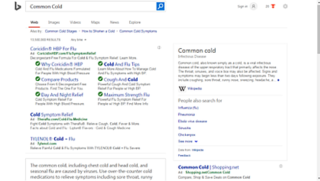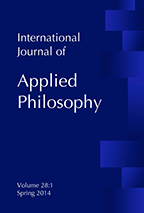Information retrieval (IR) is the activity of obtaining information system resources relevant to an information need from a collection. Searches can be based on full-text or other content-based indexing. Information retrieval is the science of searching for information in a document, searching for documents themselves, and also searching for metadata that describe data, and for databases of texts, images or sounds.

The Astrophysics Data System (ADS) is an online database of over eight million astronomy and physics papers from both peer reviewed and non-peer reviewed sources. Abstracts are available free online for almost all articles, and full scanned articles are available in Graphics Interchange Format (GIF) and Portable Document Format (PDF) for older articles. It was developed by the National Aeronautics and Space Administration (NASA), and is managed by the Harvard–Smithsonian Center for Astrophysics.

PubMed is a free search engine accessing primarily the MEDLINE database of references and abstracts on life sciences and biomedical topics. The United States National Library of Medicine (NLM) at the National Institutes of Health maintains the database as part of the Entrez system of information retrieval.

The Entrez Global Query Cross-Database Search System is a federated search engine, or web portal that allows users to search many discrete health sciences databases at the National Center for Biotechnology Information (NCBI) website. The NCBI is a part of the National Library of Medicine (NLM), which is itself a department of the National Institutes of Health (NIH), which in turn is a part of the United States Department of Health and Human Services. The name "Entrez" was chosen to reflect the spirit of welcoming the public to search the content available from the NLM.
Medical Subject Headings (MeSH) is a comprehensive controlled vocabulary for the purpose of indexing journal articles and books in the life sciences; it serves as a thesaurus that facilitates searching. Created and updated by the United States National Library of Medicine (NLM), it is used by the MEDLINE/PubMed article database and by NLM's catalog of book holdings. MeSH is also used by ClinicalTrials.gov registry to classify which diseases are studied by trials registered in ClinicalTrials.
eMedicine is an online clinical medical knowledge base founded in 1996 by Scott Plantz MD FAAEM, Jonathan Adler MD MS FACEP FAAEM, a computer engineer Jeffrey Berezin MS. The fundamental concept was to create a large repository of professional level medical content that could be both updated and accessed continuously to assist in clinical care and physician education. The eMedicine website consists of approximately 6,800 medical topic review articles, each of which is associated with one of 62 clinical subspecialty "textbooks". Pediatrics, for example, has 1,050 articles organized into 14 subspecialty "textbooks" ; the emergency medicine volume has 630 articles and internal medicine is near 1,400. If the remainder of the specialty textbooks are added to the total 6800+ articles were created in eMedicine. In addition, the knowledge base includes over 25,000 clinically multimedia files. To create this online content over 11,000 board certified healthcare specialists were recruited and managed in a first generation, proprietary learning management system (LMS). To provide some perspective on the amount of content that was created it is estimated that, if hard-copy printed out, it would total over 1 million pages.
Index Medicus (IM) is a curated subset of MEDLINE, which is a bibliographic database of life science and biomedical science information, principally scientific journal articles. From 1879 to 2004, Index Medicus was a comprehensive bibliographic index of such articles in the form of a print index or its onscreen equivalent. Medical history experts have said of Index Medicus that it is “America's greatest contribution to medical knowledge.”
eTBLAST is a now-defunct free text similarity service search engine which offered access to the MEDLINE database, the National Institutes of Health (NIH) CRISP database, the Institute of Physics (IOP) database, Wikipedia, arXiv, the NASA technical reports database, Virginia Tech class descriptions and a variety of databases of clinical interest. eTBLAST searched citation databases and databases containing full text, such as PUBMED. The eTBLAST server compared a user's natural text query to target databases using a hybrid search algorithm consisting of a low-sensitivity weighted keyword-based first pass followed by a novel sentence-alignment based second pass. eTBLAST was a web-based service of The Innovation Laboratory at the Virginia Bioinformatics Institute.
BRS/Search is a full-text database and information retrieval system. BRS/Search uses a fully inverted indexing system to store, locate, and retrieve unstructured data. It was the search engine that in 1977 powered Bibliographic Retrieval Services (BRS) commercial operations with 20 databases ; it has changed ownership several times during its development and is currently sold as Livelink ECM Discovery Server by Open Text Corporation.
Medical literature retrieval or medical document retrieval is an activity that uses professional methods for medical research papers retrieval, report and other data to improve medicine research and practice.
Embase is a biomedical and pharmacological bibliographic database of published literature designed to support information managers and pharmacovigilance in complying with the regulatory requirements of a licensed drug. Embase, produced by Elsevier, contains over 32 million records from over 8,500 currently published journals from 1947 to the present. Through its international coverage, daily updates, and drug indexing with EMTREE, Embase enables tracking and retrieval of drug information in the published literature. Each record is fully indexed and Articles in Press are available for some records and In Process are available for all records, ahead of full indexing. Embase's international coverage expands across biomedical journals from 95 countries and is available through a number of database vendors.
SafetyLit is a bibliographic database and online update of recently published scholarly research of relevance to those interested in the broad field of injury prevention and safety promotion. Initiated in 1995, SafetyLit is a project of the SafetyLit Foundation in cooperation with the San Diego State University College of Health & Human Services and the World Health Organization - Department of Violence and Injury Prevention.

Bing Health is a health-related search service as part of Microsoft's Bing search engine. It is a search engine specifically for health-related information through a variety of trusted and credible sources, including Medstory, Mayo Clinic, National Institutes of Health's MedlinePlus, as well as from Wikipedia.
Developmental Psychology is a peer-reviewed academic journal published by the American Psychological Association covering research in developmental psychology. Publishing formats are research articles, reviews, and theoretical or methodological articles. The current editor-in-chief is Eric F. Dubow.

The International Journal of Applied Philosophy is a biannual peer-reviewed academic journal that publishes philosophical examinations of practical problems. It was established in 1982, and contains original articles, reviews, and edited discussions of topics of general interest in ethics and applied philosophy. The journal is published by the Philosophy Documentation Center, and some articles are published in co-operation with the Association for Practical and Professional Ethics.
Anne O'Tate is a free, web-based application that analyses sets of records identified on PubMed, the bibliographic database of articles from over 5,500 biomedical journals worldwide. While PubMed has its own wide range of search options to identify sets of records relevant to a researchers query it lacks the ability to analyse these sets of records further, a process for which the terms text mining and drill down have been used. Anne O'Tate is able to perform such analysis and can process sets of up to 25,000 PubMed records.
The Journal of Cross-Cultural Gerontology is a peer-reviewed academic journal publishing articles on the aging process. The journal includes articles covering both Western and non-Western societies, covering disciplines including history, anthropology, sociology, political science, psychology, population studies, and health care and taking both theoretical or applied approaches.
The Journal of Medical Toxicology is a peer-reviewed medical journal on medical toxicology and the official journal of the American College of Medical Toxicology. It publishes original articles, illustrative cases, review articles, and other special features that are related to the clinical diagnosis and management of patients with exposure to various poisons. It was established in 2005 and published by the University of Pennsylvania Press. Since 2010 it is published by Springer Science+Business Media. The editor-in-chief is Mark Mycyk, MD.
Arrowsmith was a Literature-based discovery system built by Don R. Swanson using the concept of Undiscovered Public Knowledge. He called it Arrowsmith: ‘An intellectual adventure’
"Imagine that the pieces of a puzzle are independently designed and created, and that, when retrieved and assembled, they then reveal a pattern – undesigned, unintended, and never before seen, yet a pattern that commands interest and invites interpretation. So it is, I claim, that independently created pieces of knowledge can harbor an unseen, unknown, and unintended pattern. And so it is that the world of recorded knowledge can yield genuinely new discoveries"





